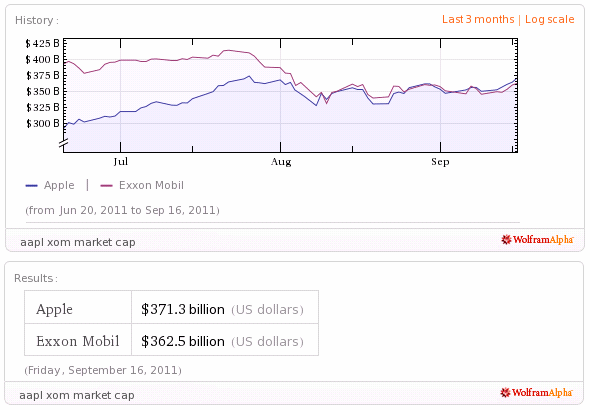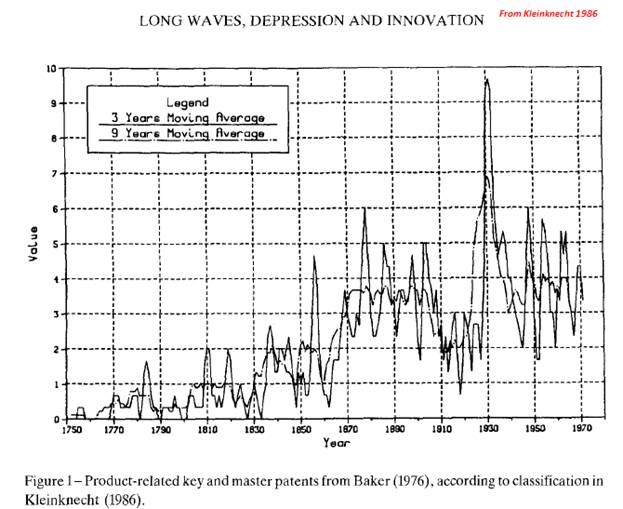World crisis and it sector

When I wrote previous articles about the crisis a couple of months ago, the very idea of it did not yet penetrate the masses. No, there are many experts who have been writing about him for quite some time. But now they have started talking a lot about him everywhere and that means the situation is becoming more serious. Pessimism reigned in the markets, the economic performance of leading countries is deteriorating , in Europe Greece is frantically trying to get new loans to pay off old ones, and the talk that this is its default is inevitable is getting louder. And this morning, Standard & Poor's lowered Italy 's credit rating from A + to A, and the outlook is negative.
Against this background, stands out “fruit company”, which overtook the leader in recent years ExxonMobil (the largest oil refining company in the world). This, of course, pleases the adherents of the theory of the “new economy”, who are mistaken in believing that the crisis will bypass it and the high-tech sector.
In general, the it-revolution differs from previous technological breakthroughs in that it did not bring fundamental changes to the “old, traditional economy” as it happened before it. The conveyor changed industrial production to make it relatively cheap. Machines and pesticides have changed agriculture by making food production in quantities sufficient for a growing population of the earth largely independent of environmental conditions. The industrial production and refining of oil has changed the availability of energy and the production of artificial materials. The influence of it on the traditional economy was concentrated in marketing and management without having made a qualitative breakthrough in the basic industrial processes and having failed to significantly reduce their cost.
Instead, new industries have emerged in the storage, transmission, and processing of information. The “new economy” was born, but did not become independent from the old and did not merge with it bringing it to a new level. It is more like an additional floor of a house built on old walls. The new tenants are still happy about the new Euro-renovated apartments, but in the basement the sewage system has broken, the water in the faucet flows through once, and the foundation has cracked.
Some in the new economy are selling, advertising, and marketing old products. Others help her in organizing production processes. Still others focused on meeting our hedonistic needs. All the heroes of our time, who grew up on the increased demand and consumption of the last decades, which in turn was the result of reigonomywith its non-stop lending - all of them are linked in a thick chain to the old economy. I believe that considering them in isolation is a mistake. Our upper floor will not stand for long without walls and a foundation.
This is clearly seen in the example of mobile advertising: a study conducted by comScore shows that 30% of advertising falls on consumer discretionary (luxury goods: cars, clothes, services) and consumer staples (consumer goods: food, medicine, etc.). Another 8% on finance and industry.

Its main part falls on the products of the new economy themselves. Of course, mobile advertising is not the whole it-sector, but the data in my opinion is indicative.
The global economy is slowly stagnatinglast months. Even taking into account the constant “revision” of official statistics. The it-sector seemed to stand out positively against this background, but the research of the it-services market from the Ovum consulting agency arrived in time and it turned out that things were not so smooth in the Danish kingdom:
“Analysts recorded a significant decrease in demand for IT services in the II quarter of 2011 . North America showed the weakest indicators - its share in the global private sector IT services market fell from 39% to 15.5%. "
" The sum of all contracts for the provision of IT services and supply concluded in the world in the II quarter of 2011 equipment decreased by 40% p compared with the same period last year to a minimum over the past 8 years. ”
“The results at the beginning of this year were disappointing. And now, in the second quarter, the situation that we thought was bad has gotten worse, ”commented Ovum analyst Ed Thomas. - The volume of contracts and their number do not promise anything good. As a result of declining demand from private companies, especially in the USA, and the absence of major agreements, the market sank significantly. At the same time, the state sector, which is characterized by large sums, did not help either. ”
The phrase“ demand reduction ”is key - without credit for the last decades, this demand in all sectors of the economy will fall for a long time despite all efforts to support it.
Another popular opinion about the high-tech sector is that it is he who will save us all from the crisis. The economist Alfred Kleinknecht, for example, analyzed the number of patents granted between 1901 and 2005 and found that there were clear innovation surges during periods of economic depression.

But despite this, economic growth in America after the Great Depression began precisely with the Second World War. The huge war machine in the 40-45s, access to new markets after the victory of the coalition and the emergence of the dollar as the world currency became the basis of the economic prosperity of America of the 20th century. Therefore, I would not overestimate the role of innovation in the coming crisis.
I would like to finish on some positive note, but statistics are stubborn things, and so far do not give reasons for optimism. However, he who is warned is armed.
